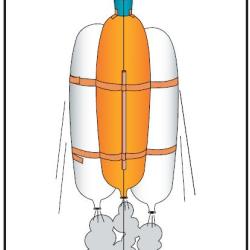Source Institutions
Source Institutions
Add to list Go to activity
Activity link broken? See if it's at the internet archive

In this activity, learners work in NASA teams to build balloon-powered rockets using identical parts and compete to launch the greatest number of paper clips to "space" (the ceiling). The rockets learners build model the Ares V heavy lift launchers that carry heavy payloads into orbit. This lesson plan includes background information, tips, discussion questions and answers, and a "Mission Report" sheet for learners.
- 30 to 45 minutes
- 1 to 2 hours
- $10 - $20 per group of students
- Ages 8 - 14
- Activity, Experiment/Lab Activity, Lesson/Lesson Plan, Model
- English
Quick Guide
Materials List (per group of students)
- Large binder clips (one per launch pad)
- Fishing line or smooth string
- Long balloons (sometimes called 524 airships or balloons)
- Bathroom size (3 oz) paper cup
- 2 straight drinking straws
- 50 small paper clips
- Sandwich size plastic bag
- Masking tape
- Balloon hand pumps (optional)
- Wooden spring-type clothespins (optional)
Subjects
-
Earth and Space Science
-
Astronomy
- Probes, Satellites and Spacecraft
-
Astronomy
-
Engineering and Technology
-
Engineering
- Aerospace Engineering
-
Technology
- Transportation
-
Engineering
-
Mathematics
-
Data Analysis and Probability
- Data Analysis
- Data Collection
- Data Representation
- Number and Operations
- Reasoning and Proof
- Representation
-
Data Analysis and Probability
-
The Nature of Technology
-
The Design Process
- Research and Development
- Invention and Innovation
- Troubleshooting and Maintenance
-
The Design Process
-
Physical Sciences
-
Motion and Forces
- Machines
- Momentum and Velocity
- Acceleration
- Projectile Motion
- Newton's Laws
- Center of Gravity
-
Structure and Properties of Matter
- Mass and Weight
-
Motion and Forces
-
The Nature of Science
-
The Scientific Process
- Conducting Investigations
- Gathering Data
- Formulating Explanations
- Communicating Results
-
The Scientific Process
Informal Categories
- Model Building
Audience
To use this activity, learners need to:
- see
- read
- be mobile
- touch
Learning styles supported:
- Involves teamwork and communication skills
- Uses STEM to solve real-world problems
- Involves hands-on or lab activities
Other
Includes alignment to state and/or national standards:
Includes assesments for student learning:
This resource is part of:
Access Rights:
- Free access
By:
- Shearer, Deborah A. ; Vogt, Ed.D., Gregory L.
Rights:
- Public domain, ,
